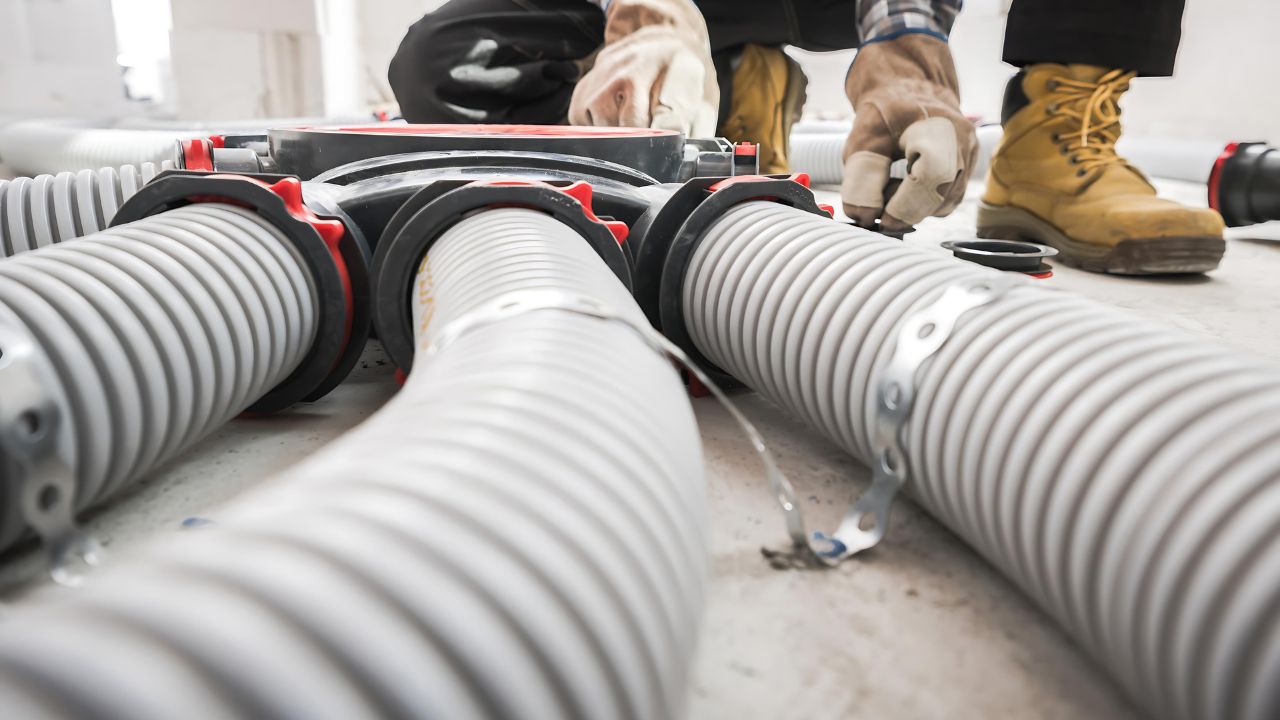Are you wondering how long your MVHR system will last?
Knowing the lifespan of your MVHR system is important for planning maintenance and budgeting for future replacements.
Mechanical Ventilation with Heat Recovery (MVHR) systems provide energy-efficient ventilation for homes and businesses, but their longevity can vary based on several factors.
In this blog, we will explore the average lifespan of MVHR systems, key factors influencing their durability, signs indicating it might be time for a replacement, and tips to extend their life.
So, let’s learn more about how you can ensure your MVHR system serves you well for years to come!
What is MVHR? And How Does an HRV (MVHR System) Work?
Mechanical Ventilation with Heat Recovery (MVHR) is a system that provides fresh air to your home while saving energy.
It works by taking the stale air from inside your home and replacing it with fresh air from outside. The heat from the stale air is used to warm the fresh air, making it energy-efficient.
An MVHR system consists of several components:
- Fans: These move the air in and out of your home.
- Heat exchanger: This transfers the heat from the outgoing air to the incoming air without mixing the two.
- Filters: These clean the air before it enters your home, removing dust and other particles.
- Ducts: These carry the air throughout your home.
Using an MVHR system has many benefits. It ensures your home is always filled with fresh, clean air, which is good for your health.
It also helps to reduce energy bills by reusing the heat from the air that would otherwise be lost. This makes your home more energy-efficient and comfortable.
This system ensures your home is fully ventilated year-round, recovering up to 95% of the heat that would otherwise be wasted, resulting in significant energy savings.
With a heat recovery system, your property remains airtight, removing the need for window vents or bathroom extractor fans. This system contributes to a healthier, quieter living environment.
Key Factors Influencing MVHR Lifespan
The average lifespan of an MVHR unit is generally around 15 years. Several factors can influence how long your MVHR system will last.
Understanding these can help you maintain your system better and ensure it has a long and efficient life.
Quality of Installation:
The lifespan of your MVHR system greatly depends on how well it was installed. If the system is set up correctly by a professional, it will run more efficiently and last longer. Poor installation can lead to problems that shorten the system’s life.
Regular Maintenance:
Keeping your MVHR system well-maintained is important. Regularly changing filters, cleaning the ducts, and checking the fans and heat exchanger can prevent issues from developing. A well-maintained system will function better and last longer.
Usage Patterns:
How often you use your MVHR system affects its lifespan. Systems that run continuously may wear out faster than those used less frequently. However, these systems are built to run continuously, so normal usage should not significantly reduce their lifespan.
Environmental Factors:
The environment where you live can impact your MVHR system. In areas with a lot of dust or pollution, the filters and other parts may wear out more quickly. Regular cleaning and filter changes can help counter these effects and extend the system’s life.
Signs Your MVHR System Needs Replacement
Knowing when to replace your MVHR system is just as important as maintaining it. Here are some signs that it might be time for a new system.
Decreased Efficiency:
If your MVHR system is not as efficient as it used to be, it might be time for a replacement. Signs of decreased efficiency include longer times to heat or cool your home and higher energy bills. These indicate that the system is not working as well as it should.
Frequent Repairs:
If you find yourself frequently calling for repairs, it might be more cost-effective to replace the system. Constant breakdowns and the need for frequent repairs can be a sign that the system is reaching the end of its lifespan.
Outdated Technology:
MVHR systems have seen many technological advancements. If your system is old, it might not have the latest features that improve efficiency and performance. Upgrading to a newer system can provide better air quality, lower energy bills, and more reliable operation.
How Can You Extend the Lifespan of Your MVHR System?
To get the most out of your MVHR system, it’s important to take steps to extend its lifespan. Here are some key tips to help you keep your system running smoothly for years.
Proper Installation:
Ensure that your MVHR system is installed by a qualified professional. A correct installation ensures all parts are working efficiently and reduces the risk of future problems. A well-installed system will last longer and perform better.
Routine Maintenance:
Regular maintenance is crucial for extending the lifespan of your MVHR system. This includes changing filters, cleaning the ducts, and checking the fans and heat exchanger. Scheduling regular servicing with a professional can prevent small issues from becoming big problems.
Smart Usage:
Use your MVHR system in a way that balances performance and longevity. Avoid overworking the system by ensuring it’s set to an appropriate level for your home’s needs. Proper usage can help prevent unnecessary wear and tear.
Quality Components:
Use high-quality replacement parts and filters for your MVHR system. Cheap or low-quality parts can wear out quickly and cause more damage to the system. Investing in good-quality components can help your system last longer and work more efficiently.
Conclusion
Understanding the lifespan of your MVHR system and how to maintain it can save you time and money. Proper installation, regular maintenance, smart usage, and quality components are key to extending your system’s life. Recognising signs that indicate it might be time for a replacement ensures your home remains energy-efficient and comfortable.
If you need expert services for your MVHR system, contact VentSolve. Our team is here to help you get the most out of your system and ensure it serves you well for years to come. Get in touch with us today!
FREQUENTLY ASKED QUESTIONS
1. How long does an MVHR system last?
An MVHR unit typically lasts around 15 years, depending on factors like installation quality, maintenance, usage, and environmental conditions.
2. What maintenance does an MVHR system need?
Regular maintenance includes changing filters, cleaning ducts, and checking the fans and heat exchanger. Professional servicing is recommended annually to ensure optimal performance.
3. Can I install an MVHR system myself?
It’s best to have a qualified professional install your MVHR system. Proper installation ensures efficiency and longevity, reducing the risk of problems down the line.
4. How can I tell if my MVHR system needs replacement?
Signs that your MVHR system needs replacement include decreased efficiency, frequent repairs, and outdated technology that lacks modern features.
5. What affects the lifespan of an MVHR system?
The lifespan of an MVHR system is influenced by installation quality, regular maintenance, usage patterns, and environmental factors like dust and pollution levels.
6. How often should I change MVHR filters?
MVHR filters should be changed every 6 to 12 months, depending on the manufacturer’s recommendations and the air quality in your area.


